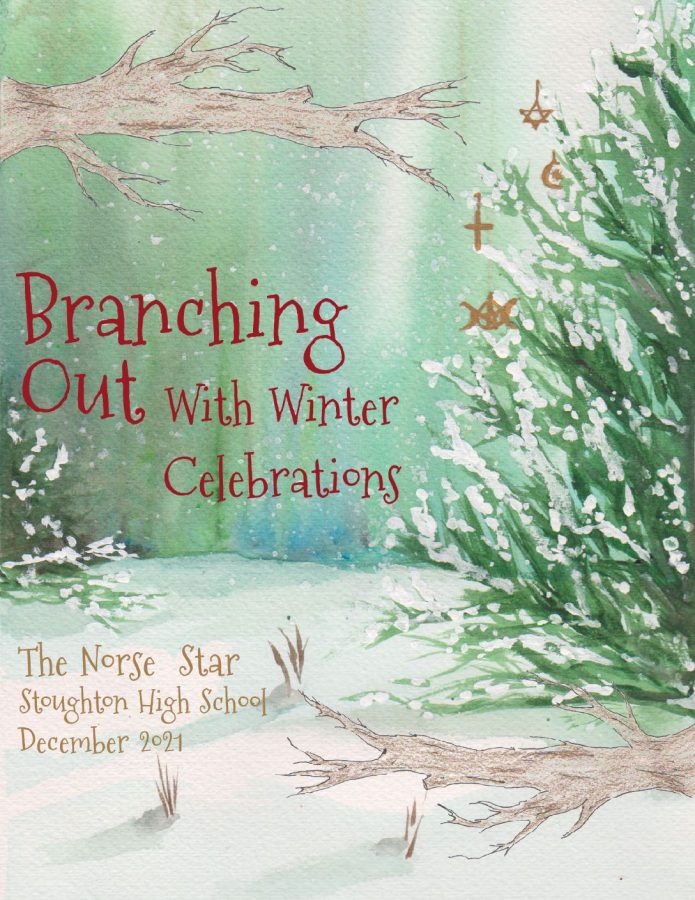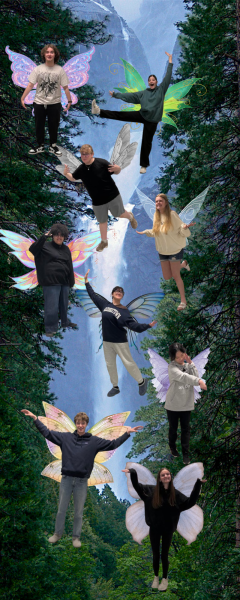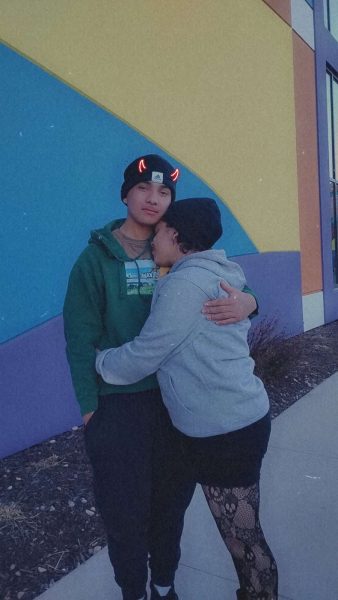Branching Out With Winter Celebrations
Celebrating Christianity
It’s that time of year again. Snow is falling, choirs are caroling, and Luke Pugh – Stoughton resident and SHS senior – is spending time with his family as the Christmas holiday moves closer. Pugh is a practicing Christian who has been religious his entire life, but he has begun to take the religion more seriously in recent years.
“When you decide you are becoming a Christian and have faith in Jesus and God, you really need to study the Word and realize that it is part of your lifestyle. Being a Christian should be displayed through every single part of your life; it shouldn’t just be pushed aside when you’re doing [other] things because we should represent Christ through everything we do,” Pugh says.
Pugh attends Lakeview Church near Sandhill Elementary School in Stoughton with his family. Raised in a Catholic household, Pugh and his entire family have practiced Christianity and celebrated Christmas for years, but according to Pugh, they are making efforts to move away from the more modern, trivial aspects of the holidays.
“It seems like for a lot of families Christmas is rather gimmicky […] You do stuff in the snow, set up your tree, decorate your house, make cookies and stuff like that, and exchange presents. But it [should be more about] remembering that we’re celebrating the birth of our Father and Christ. [My family and I] are just trying to think [about] bringing it back to more of what Christmas actually represents,” Pugh says. Christmas traditions for families around the world include, like Pugh said, decorating evergreen trees with festive ornaments, exchanging gifts the morning of Dec. 25, and decorating cookies with family. However, Pugh hopes to focus less on these practices and more on the origins of the holiday.
“It’s a celebration of the birth of Christ. So basically, the man that they all talk about in Christianity – Jesus – He was God in the flesh. […] It’s just a celebration of His birth and how He came to help forgive us of all of our sins,” Pugh says. Traditionally, the Pugh family will put up a countdown calendar to Christmas, with each day containing a different verse of the Scripture of the Bible, a volume believed to contain the word and ideologies of God before He left Earth. In addition, they will prepare dishes such as ham, green bean casserole, and classic sugar cookies.
“We go to the Christmas service that is on the Saturday night [before Christmas], and they always bring around these candles specifically on this day. We sing classic church Christmas songs,” Pugh says. “[The service] usually shares the classic story of when Jesus was born to Mary and Joseph, and they had all the people come and give them gifts. They’re guided through the stars in order to see Jesus – because they knew it was a significant moment in their lives, because they could just feel it – and brought them to the stable where Jesus was born.”
Though the month of December is an especially important one to those practicing Christianity, the ideologies and principles behind the religion stay relevant year-long.
“Kindness is definitely a main value of Christianity because you’re supposed to be very kind and forgiving to others. The whole idea of Christianity is that you’re supposed to represent yourself like you’re representing Christ and that you’re forgiven of all your sins[…] You want to be kind and forgiving to others, and then show that through your work out in the world,” Pugh says. “Especially when […] making choices, you’re like, thinking about that a lot. When you’re in the process of, maybe something that’s bad, or you think you’re doing bad things you think ‘am I representing Christ here?’ So I feel like [Christianity] leads me to make better decisions in my life, and I think I need to continue thinking of that because then I can continue making better decisions.”
For Pugh, the upcoming winter break means more time to get in touch with Christ and the true meaning of Christmas.
“I’m excited to get more in touch with myself and my Christianity, and to be able to practice more,” Pugh says. “ [I’m going to] think about really what the celebration is–more than just this gimmicky version of Christmas that has begun [to be normalized]–and I guess, just make sure I’m reflecting my actions of Christ during the season, especially.”
Journeying into Judaism
HS junior Zoe Lulinski spins a dreidel on her kitchen table as her mother lights the menorah, signifying that the first night of Hanukkah has begun. Lulinski has practiced Judaism since she was younger, and was raised on the ideologies of the religion.
“A main value of [Judaism] is to always be kind and to show love to each other,” Lulinski says. Lulinski is not the only one in her family who practices Judaism, but her entire family does not take part. “[My family] share[s] each other’s beliefs, but my mom is Jewish and my dad was raised Catholic. Both sides of the family are supportive, and I still celebrate holidays like Christmas and Easter with my dad’s side of the family,” Lulinski says.
Lulinski then goes on to explain some of the Jewish holidays she celebrates with her family.
“Some of our holidays include Rosh Hashanah, [the] beginning of Jewish new year [and] Yom Kippur, [the] end of Jewish new year. During Yom Kippur, we usually fast for the day until sundown. These usually take place one week from each other in September or October. These are the two holiest holidays of the year,” Lulinski says.
Lulinski also shares about Passover and how it coincides with the Christan holiday, Easter.
“During Passover, we have a large feast called the Sedar. [It’s] a major holiday that celebrates the liberation of Israelites from slavery in Egypt. During Passover, we don’t eat foods with leavening,” Lulinski says. Leavening is a substance used in dough or batter to make it rise.
Lulinski describes Hanukkah, often celebrated in the month of December, in more detail. “We celebrate Hanukkah around the winter season, which is eight nights in a row. However, due to the Jewish calendar, the times of holidays could vary. For example, this year Hanukkah is towards the end of November and the beginning of December,” Lulinski says.
Some of the foods Lulinski mentioned she and her family eat during Hanukkah are mainly oily foods such as “donuts [and] potato latkes”. Potato latkes are like potato pancakes. Lulisnki then goes on to explain the traditions she and her family take part in, as well as a brief history of why.
“Hanukkah is […] known as the festival of lights. […] For Hanukkah, what we do is we have something called the menorah. And then every night we have candles that we light[…] and don’t blow them out. You just let them go out [by] themselves. For Hanukkah, what we do is one gift per night for my family.”
Hanukkah stems from a legend about the people in the Temple of Jerusalem. The story goes that the practicing Jewish people, trapped in a destroyed temple, only had enough oil to light their menorah for one night. However, miraculously, the menorah stay lit for eight nights.
“It’s kind of just us, celebrating the fact that it was […] a miracle that [the candles] were able to last so long,” Lulinski says.
Some of the activities she and her family perform include lighting the menorah during Hanukkah and playing games with dreidels.
“We hid the afikoman during which immediately follows the main meal. My grandpa would hide it somewhere in the house, and all of the kids would go looking for it. Everyone would get a prize but whoever found the afikoman […] would get the biggest prize,” Lulinski says.
An afikoman, also referred to as matzo, is a type of flatbread eaten during Hanukkah and is usually eaten as a dessert or a prize. Though, clouding the mentions of food and games and tradition, Lulinski shares a negative side to being Jewish.
“There are sometimes stereotypes that Jewish people are cheap. This stems from when Jewish people were put into ghettos and forced to give up their belongings during the beginning of the Holocaust,” Lulinski says.
Lulinski’s solemn remark, though sobering, just gives her and her family a deeper understanding of what they truly believe in, and for Lulinski, it’s her family and her friends. So this winter, Lulinski plans on enjoying the long break ahead.
Luliknski says, “[I’m going to] hang out with friends and family heading into this happy holiday season.”
Practicing Paganism
A smile crosses junior Ani Allen’s face as her siblings’ laughter echoes through the house. They watch,, bemused, as they decorate the Christmas tree together, hanging cheesy homemade ornaments from its branches and stringing lights through the leaves. Stirring their tea, Allen (pronouns: she/they), turns away from the Christmas festivities and back towards the object of their previous attention: their altar, where they practice the religion of Paganism.
“There are a lot of main values that would be applied to the majority of people who practice [this] religion, [such as] just worshipping the earth, [believing in] equality, […] [and] worshipping the planet,” Allen says. They gave an in-depth view on the practice of Paganism, its qualities, its traditions, and their way of practicing.
To give a brief synopsis on the history of Paganism, it is referred to as the religion of the ancient world. Allen describes the religion as being very broad and universal, as it is one of the oldest religions known to man.
“It’s one of the oldest religions, and a lot of holidays and religions are based off of and inspired by Paganism,” Allen says. As for their winter traditions in Paganism, Allen gives insight into Christmas, a holiday typically associated with Christianity.
“The winter solstice is technically Christmas. Well, it was originally [called] Yule. […] Christmas is originally a Pagan holiday,” Allen says.
Diving further into Paganism and the winter solstice, Allen paints a picture of the objects and rituals that may be familiar to some who celebrate Christmas every year.
“The winter solstice is celebrating the sun returning to earth. There’s a lot of ways to celebrate it[…] [For instance], decorating a Christmas tree. A lot of Pagans like to light fires out of a fireplace […] or candles for the winter solstice, to keep burning for a day or two,” Allen says. Allen states that they do celebrate Christmas as well as the winter solstice, due to some of their family being Christian.
“My mom is Pagan, and she has been for a long time. The family that I live with; […] we don’t really celebrate things in a religious way. I know that my grandpa, my sister, and my uncle are Christian. We don’t really incorporate [Christianity] into Christmas or anything,” Allen says. Allen and their mother still celebrate a traditional Christmas with the rest of their family in winter, since the holiday honors both beliefs.
Even if their family chose not to celebrate Christmas, Allen remarks that they, alone, still would. “Christmas is originally a Pagan holiday, so I would celebrate it, just in a different way. [I would] use different terms and have more of a ritual to do without having to focus mainly on family traditions,” Allen says.
Allen also discussed their reasoning for being a Pagan, as they were not born into it, but have only practiced the religion for the past three years.
“[I practice Paganism] because of what it stands for — believing in the earth,” Allen says. “It’s a pretty vast thing, but I definitely think that worshipping the earth is something that the majority of people that are Pagan would say [is key].” Another thing that makes this religion unique from others is the specifics of the tools and actions worshippers can utilize in practice. Paganism has its own traditions, from the celebration of the winter solstice to the everyday practice of making spell jars and manifestation of good intention, as described by Allen.
“I have […] things sort of representing aspects of Paganism, the earth, and what I stand for. I have some [ethically-sourced] animal bones. I have things that are important that friends have given me. I like to keep flowers […] and I’d use those petals for spells and things like that,” Allen says. “They’re not necessary for practicing. They’re tools and they can help you, but they aren’t necessary at all. Like I said, it really depends heavily on your intentions.”
Allen delves further into the explanation of practicing with intention and manifestation of positive thoughts.
“I guess it depends on what it’s for, and if you’re doing something with a specific intention. So, a lot of the time I would do protection spells for people I care about, myself, or just something [I’m] trying to manifest into existence or into my life or another person’s life. I use a lot of flower petals and crystals,” Allen says.
As well as sharing their thoughts about the religion and practices they partake in, Allen also gives insight on some of the more negative aspects of practicing a unique religion, such as the negative stereotypes and language they’ve been exposed to as a practicing Pagan.
“A lot of people think that [Paganism] means worshipping Satan, even though Satan isn’t completely Satan in Paganism and is not perceived as a bad deity,” Allen says. “A lot of people […] will not know enough about Paganism and make assumptions about us being evil or using things like witchcraft or worship for bad. They typically think it’s a negative thing.”
Even though Allen has received backlash for their practice, they made a point not to let the responses affect them. “I get called a witch, but it’s not really an insult at this point. I don’t let it get to me because it doesn’t matter what people’s opinions are.”
Illustrating Islam
A flurry of snow passes through Stoughton, coating the shops of Main Street in a frosty sheen, and Fatushe Haklaj, a Stoughton resident since 1999, prepares a delicious batch of baklava, portraying a state of calm amidst a frenzy of religious winter festivities.
Haklaj is an educational assistant with the bilingual program in Stoughton. She has practiced Islam since she was born. After fleeing her home country of Kosovo during a war in 1998, she and her family moved to Stoughton as refugees, and they have lived here ever since.
“My family and I have been Muslim for our entire lives. […] We lived in a community where everyone was Muslim,” Haklaj says. “The religious holiday that we celebrate — [Ramadan] — varies from year to year because it follows the lunar calendar rather than the regular one. So, it almost seems like every year it happens two weeks prior to the year before. Sometimes it could end up during the winter, and sometimes it’s in the middle of the summer.”
As well as explaining the cyclical pattern of Islamic holidays, Haklaj explains the holiday Ramadan and how it is celebrated by her and her family.
“Our main religious holiday, […] it’s called Ramadan. Ramadan is celebrated once a year and during that celebration — it’s for one month, depending on when that month falls — you have to fast from sunup to sundown all day, and that’s including water; […] you can’t have food, water or anything,” Haklaj says. “During that holiday, you also hold back from a lot of other things — like, for example, swearing. It’s kind of like a holiday that cleanses your whole body. [You] cleanse your mouth, cleanse your mind; you always have to have positive thoughts. For example, if a war was broken [out] during that holiday, the fighting will stop. That’s how important that holiday is for Muslims.”
Haklaj also explains the Muslim holiday following Ramadan, explaining when it is celebrated and just how significant it is.
“Then following that holiday, we celebrate three days and it’s called Eid. That is the three days where you make a lot of food and you eat all the time [and] you visit family. It’s just one of the most important holidays. Now Eid, though, is celebrated twice a year. One time with Ramadan, which is called the Eid Mubarak, where it’s the big Eid, and then you have a small one that is without Ramadan,” Haklaj says.
She also explains that her celebration of Ramadan had already passed this year as it fell during May, following the lunar calendar. Haklaj describes another part of the practice that she feels is not spoken or known about enough — the five pillars of Islam.
“There’s one important thing that I think people forget when it comes to Muslim faith, and it’s the five pillars of Islam. […] One is Shahad. This is [where] you have to say this particular prayer to call yourself a Muslim. […] [Another pillar], it’s praying five times a day. The other one is Zakaat […] and that means you give. Like if you have extra, you give to people that don’t have [as much]. That is one of the biggest things. […] Another one is fasting. […] Then pilgrimage, […] It’s called Hajj […] and that’s when […] you’d have to visit Mecca,” Haklaj says.
She also explains a little bit about the negativity she’s experienced as a practicing Muslim.
“When 9/11 happened, really a lot of people then wanted to know if I was a different religion or not. So I decided to cover [my faith], and since then, it’s been a lot. Not as much in school, because I think there’s people that know me, and that I’ve worked with, and all the students know me because I’ve been in the district for so long. […] But I [also] work at […] Walmart,” Haklaj says. “I have had a lot of customers stop and say all kinds of different things. Like, ‘Where in the Quran does it say to kill somebody?’, things [like], ‘I know why you cover your hair; because you’re too lazy to wash it,’ [and] things like, ‘Is your head cold? Then why do you wear a scarf?’ […] I’ll tell you that a lot of Albanian kids who are in the district will literally hide that they’re Muslim, just because they’re afraid that somebody would say something bad.”
Even though there has been backlash Haklaj has been exposed to, she still emphasized that she, as a practicing Muslim, knows how to handle people like that. She is proud of her faith, and she does not hide it anymore.
As a last thought, Haklaj tells about the values of her faith and why she practices.
“There’s nothing specific that we hold, other than that every Muslim house will have a Quran. That is like the symbol of who you are. […] In our culture, family is very important. Family is the biggest thing,” Haklaj says. “The reason we stick by it is because […] the religion brings so much for you to be a good person, to be the best you can be, to treat others right, to always be respectful, [and] to treat […] everyone the same, even if they follow a different religion.”






